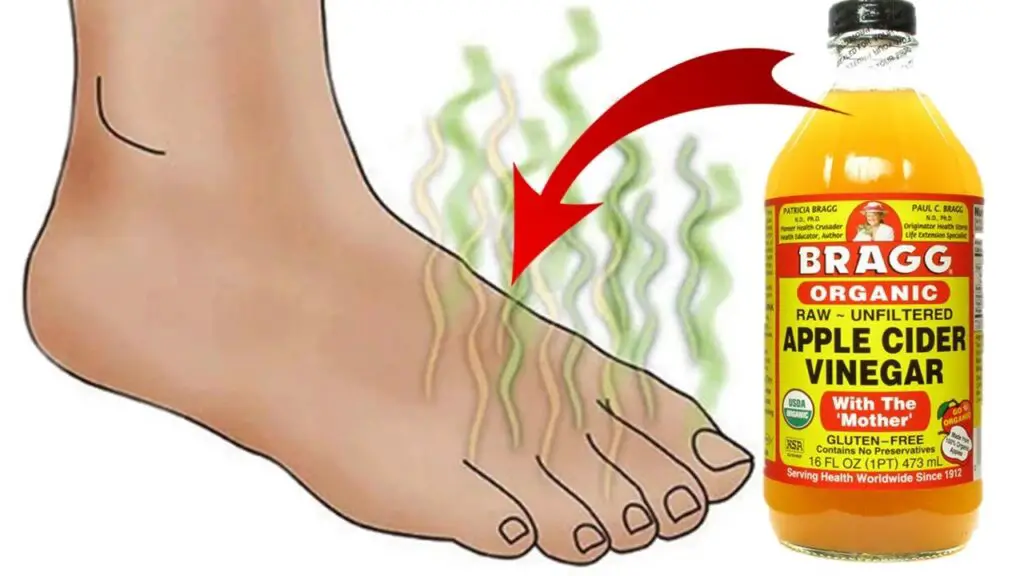Smelly feet may be embarrassing, but it’s an incredibly common health condition. It’s caused by a build-up of sweat, which leads to an overgrowth of bacteria on the skin. These bacteria are responsible for the smell you might associate with taking your shoes off after a long, hard day at work.
Anyone can get sweaty feet, and contrary to belief, you don’t necessarily need to be too hot for sweating to take place. However, there are instances that make you more prone to sweaty feet, such as wearing the same pair of shoes every day, wearing shoes that are too tight, feeling under a lot of stress, or having a medical condition known as hyperhidrosis, which makes you sweat more than usual.
Preventing Smelly Feet
Apple Cider Vinegar for Smelly Feet
If you currently only clean your feet by giving them a quick rinse-off in the shower, it’s no wonder that your sweat problem isn’t going away. Thoroughly soaking your feet is the best way to properly clean your skin and keep the bacteria at bay – but you’ll need to have some apple cider vinegar to hand if you want to experience the best results.
Apple cider vinegar is well known for its ability to protect against bacteria, fungi, and other harmful micro-organisms, thanks to its acetic acid content. It’s a great disinfectant and has been found in studies to present anti-fungal and antibacterial activity against the likes of E-coli and S. aureus, a common bacterium found in the skin.
It’s thought that apple cider vinegar may specifically help to treat foot odour, caused by excess sweating; and athlete’s foot, a fungal infection that causes itching and skin rawness; as well as warts, caused by a virus that infects the skin.
Our feet are so prone to sweat and smelliness because they can quite easily become dehydrated, and they’re also exposed more frequently to environments where the likes of bacteria and fungi can grow. If you don’t regularly clean your footwear, these micro-organisms can build up over time, making the problem even worse to handle.
Because vinegar is antimicrobial, experts believe that soaking your feet in a vinegar bath for ten to twenty minutes might be all it takes to kill the bacteria or fungi contributing towards foot odour.

How to Make an Apple Cider Vinegar Soak
If you want to try out your own apple cider vinegar foot spa, you won’t need anything more than warm water, apple cider vinegar, and a large basin to place your feet in. Start by filling the basin with one cup of vinegar, then add two cups of warm water. Continue with this process – one cup of vinegar, two cups of water – until the basin is full enough for you to fully submerge your feet in.
Leave your feet to soak for ten to twenty minutes. This should give the vinegar’s antibacterial and antiperspirant effects time to kick in. Once your time is up, clean your feet with a regular, soft soap, rinse with water, then pat dry with a towel.
Repeat this process on a daily basis until your odour problem is under control.
Apple Cider Vinegar Foot Soak Side Effects
There are very few side effects of using apple cider vinegar on your skin, although it’s worth keeping in mind that vinegar has a high acidity, which is why it’s essential to mix it with two parts of water. If your skin is already inflamed, you should avoid using apple cider vinegar altogether. It shouldn’t be considered a treatment for wounds, and it may even have harsh chemical effects on a wound in larger amounts.
People with diabetes should also avoid using vinegar as a foot soak. Diabetes commonly causes foot problems like
athlete’s foot, which can result in a bad odour, but it’s normally always better to seek professional medical treatment for these issues.
Conclusion
Apple cider vinegar might be more widely known for its household cleaning and cooking uses, but there are definitely benefits to be had from treating your feet to a vinegar soak.
Sweaty, smelly feet are rarely something that goes away on its own, and many treatments only work to solve the problem on a short-term basis. Apple cider vinegar, on the other hand, is designed to reduce the bacteria that cause the odour in the first place, leaving feet cleaner and odour-free.
If you don’t already have apple cider vinegar in your cupboard, you can buy it for a relatively low cost from your local supermarket or you can
buy it online here. Look for vinegar that’s organically produced if you want the best quality for your skin.
